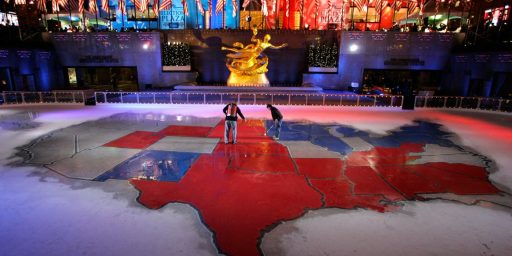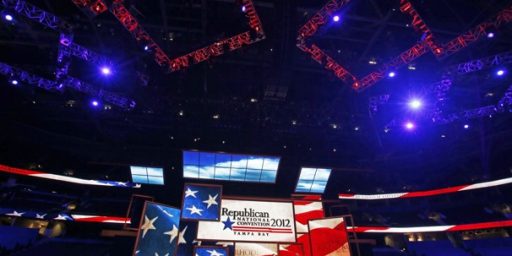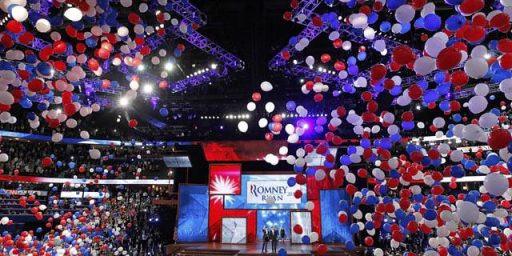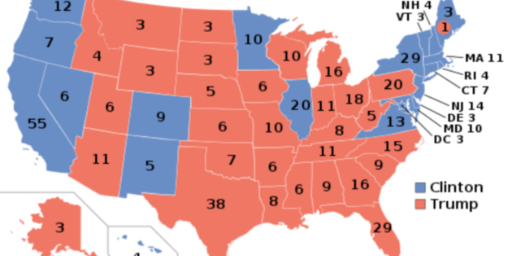Electoral College: A Defense
George Will argues that the 2008 election demonstrates precisely what the Framers sought to prevent with the Electoral College.
In a Presidential contest replete with novelties, none was more significant than this: A candidate’s campaign—for his party’s nomination, then for the presidency—was itself virtually the entire validation of his candidacy. Voters have endorsed Barack Obama’s audacious—but not, they have said, presumptuous—proposition, which was: The skill, tenacity, strategic vision and tactical nimbleness of my campaign is proof that I am presidential timber.
[…]
Under their plan, the nomination of candidates and the election of the president were to occur simultaneously. Electors meeting in their respective states, in numbers equal to their states’ senators and representatives, would vote for two people for president. The electors’ winnowing of aspirants was the nomination process. When the votes were opened in the U.S. House of Representatives, the candidate with a majority would become president, the runner-up would become vice president. If no person achieved a majority of electoral votes, the House would pick from among the top five vote getters. Note well: The selection of presidential nominees was to be controlled by the Constitution.
The Founders’ intent, [UVa political scientist James] Ceaser writes, was to prevent the selection of a president from being determined by the “popular arts” of campaigning, such as rhetoric. The Founders, Ceaser says, “were deeply fearful of leaders deploying popular oratory as the means of winning distinction.” That deployment would invite demagoguery, which subverts moderation. “Brilliant appearances,” wrote John Jay in The Federalist Papers 64, “… sometimes mislead as well as dazzle.” By telling members of the political class how not to get considered for the presidency, the Founders hoped to (in Ceaser’s words) “make virtue the ally of interest” and shape the behavior of that class.
As Will notes, however, that rationale collapsed almost immediately. Once George Washington left the scene, the aspirants to the presidency were aligned with political parties and the 2nd place finisher as VP notion became absurd. Indeed, the system has evolved radically since then:
Subsequent systems included: The selection of presidential candidates by the parties’ congressional caucuses (1796—1820); nonpartisan selection (1824—28); national nominating conventions controlled by parties’ organizations (1832—1908); a system of such conventions leavened by popular choice through a few state party primaries and caucuses (1912—68)—in 1968, Vice President Hubert Humphrey won the Democratic nomination without entering any primaries; since 1972, selection of nominees entirely by popular choice. Thus have conventions been reduced from deliberative bodies to mere ratifying bodies.
Not to be overly trite, but good and bad presidents have been selected under each system that lasted long enough to produce at least two presidents. Obama has less experience and more campaign acumen than most who have won the office but, certainly, we’ve had mediocre presidents with great resumes and good ones with weak ones.
Further, there’s a case to be made that the Electoral College actually rewards campaigning skills more than would a national popular vote. Rather than having to appeal to the broad swath of voters, one can cobble together a strategy that relies on getting out the vote in key states.






What was it, like 3 times that a popular and electoral result were in conflict? Big deal.
If we want change it should be either in the primary process, or to go whole hog for a parliamentary system.
BTW, I think the primary dates for the 50 states should be drawn from a lottery-style ping pong ball machine.
Indeed. A popular vote would ensure that candidates have to represent a broad spread of the population nation-wide, and have an incentive to campaign in the most populous states (witness Texas, California, and New York – the three most populous states, representing over a quarter of the GDP and Population, and they got very little presidential campaign attention after the primaries because the population is tilted to one side or another enough to make it not worth it in an Electoral Vote system).
The only downside is that it would probably privilege money even more in Presidential campaigns, since now a campaign might have to compete in the bigger media markets.
Brett mentions only campaigning in New York, California, and Texas. What it would really be is campaigning in New York City, San Francisco, LA, Dallas and Houston. No candidate would need to ever appear in Iowa or New Hampshire again — only the big cities.
It is my understanding it would require a constitutional amendment to change from the electoral college. I don’t think Wyoming, Utah, or Oklahoma, along with lots of other small or smaller states would ever agree. Why should they?
lol, maybe we should try that for the presidency.
Nailed it Tomas. Exactly what I was going to say. At what other time is Iowa ever even mentioned on CNN? With a popular election, the candidates would be stupid to leave the five biggest cities regardless of what states there were in. The electoral college is not based strictly on population, as each Senate seat gets a vote. So, the weight of the small states combined is more than the voter percentage. If it were not for that caveat, then we’d have a national government reflecting only the values of urbanites. That’s not fair. As far as the “inequity” of popular vote not selecting the president recently, the majority has rarely selected the president in modern times. Look how many have received less than 50%. If more people vote against a candidate, why should they proclaim to have the “popular vote”? Additionally, why should one very small region of the US ( southwest California in the most recent cases ), have the sole discretion of deciding who our president is?
The intent of the Electoral College was two-fold. First, it kept representatives from one or two states from dominating the federal government ( in those days it wasn’t New York and California, times change ), and it prevented the ignorant masses from mob rule.
In 2010 the electoral college will once again be adjusted. This time favoring conservative leaning states of the south. Coincidence?
The Electoral College was created as matter of compromise, specially because Slaves couldn´t vote. Brazil has a popular vote system and since 1990 just only candidate that went to the run-off didn´t came from the State of São Paulo, that has something like 15% of the population.
The Electoral College also allows people that don´t vote to be represented, since states have the same weight regardless of the turnout. Considering that old people has a very higher turnout than young people abolishing the Electoral College could create a geritocracy.
And no, without electoral college I doubt that the candidates would campaign in big cities. They would probably go to the SUBURBS of big cities. The problem is not the Electoral College per si, it´s the small size of the House of Representatives. Having a bigger number of Representatives would make more difficult to win the EC and lose the Electoral Vote.
I don’t see a national popular vote as a good move.
I do think it would result in the campaigns sticking mostly to the coasts and the few high population areas in between. I doubt states like Montana, New Hampshire or Iowa would get many visits if at all.
I also wonder what happens in the case of a close election and the need for recounts-is a national recount possible without it being gamed (after all Washington state and it looks like Minnesota are currently gaming the system to the democratic advantage)-and who pays for it?
If I had my druthers, we would keep the electoral college, but the states would do like Maine and split the votes by congressional district with the extra vote going to the statewide winner. I think this would make some non competitive states-like California or New York more competitive.
“If I had my druthers, we would keep the electoral college, but the states would do like Maine and split the votes by congressional district with the extra vote going to the statewide winner.”
A better idea would be to distribute the electors proportionally. 60% of the votes, 60% of the delegates. Distributing using gerrymandered districts is a bad idea.
The major problem about the elections in the United States is the total decentralization of the system,what allows fraud. Every four years I hear people in Brazil making jokes about the elections in the US.
Keep in mind that “racking up the votes” in the heavily populated areas would only be one strategy, since, as mentioned earlier, they aren’t a majority of the population. A candidate could either “run up the votes” in the heavily populated areas (which reduces transport costs, but the heavily populated cities and suburbs also tend to be the most expensive media markets), or do an “insurgency” type of campaign, drawing fractions of the popular vote from across the country.
The problem is not that candidates would only campaign in the bigger cities. The problem is that a candidate of most populated states would began the competition with a big advantage over its opponents because of name recognition.
Another problem is that because of voter fraud it would be possible for states where the political machine is controlled by one party(Like Idaho, Massachusetts, Vermont) to forge bigger turnout and improve candidates popular vote…